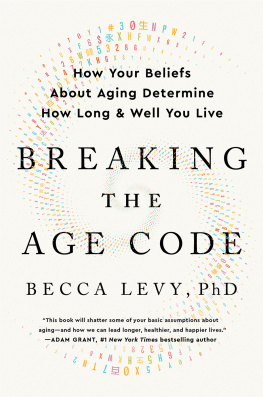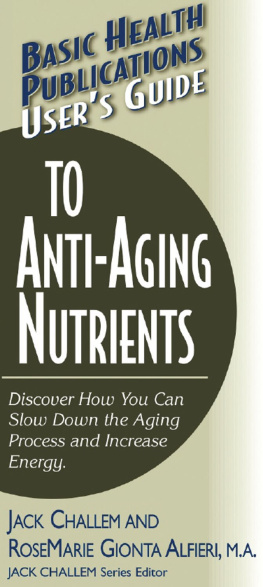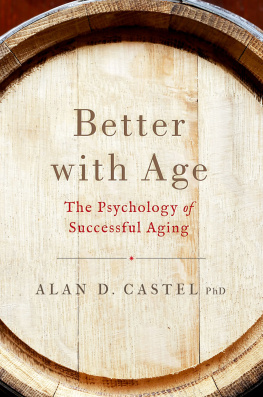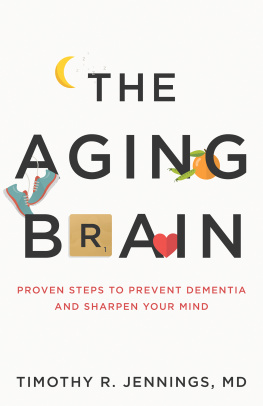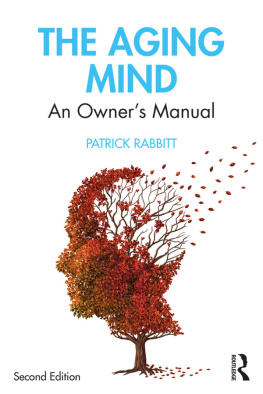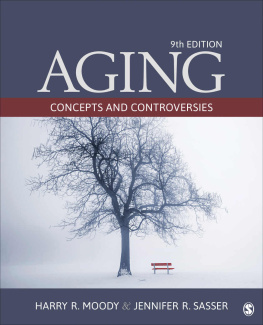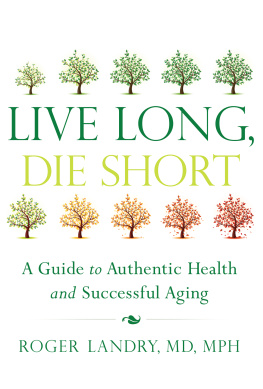Table of Contents
Landmarks
I would like to acknowledge the following people who contributed to the book in important ways through their stories, knowledge, and inspiration. Many generously gave hours of their time to chat. These include:
Carl Bernstein, John Blanton, Bethany Brown, Madonna Buder, Robert Butler, Jennifer Carlo, Neil Charness, Dixon Chibanda, Kinneret Chiel, Jessica Coulson, Wilhelmina Delco, Thomas Dwyer, Carol Fairbank, Rachella Ferst, Judy Gaeth, Susan Gianinno, Stacey Gordon, Harold Gray, Angela Gutchess, Patrick Hamilton, Nancy Hill, Paul Irving, Maurine Kornfeld, Nina Kraus, Suzanne Kunkel, Jack Kupferman, Liz Lerman, Vladimir Liberman, Kathryn Lovinsky, Richard Marottoli, Deborah Miranda, Piano Noda, Helga Noice, Tony Noice, Daniel Plotkin, David Provolo, Nancy Riege, Elisha Schaefer, Bridget Sleap, David Smith, Wilhelmina Smith, Quinn Stephenson, Jemma Stovell, Kane Tanaka, Irene Trenholme, Christopher Van Dyck, Yumi Yamamoto, Robert Young, the Anti-Amyloid Treatment in Asymptomatic Alzheimers Disease participants, and the Wrinkle Salon participants.
It takes a village to conduct research. I could not have carried out the research described in these pages without the expertise of many people. I feel lucky to have been able to work with the following excellent colleagues: Heather Allore, Kimberly Alvarez, Ori Ashman, Mahzarin Banaji, Avni Bavishi, Eugene Caracciolo, E-Shien Chang, Pil Chung, Mayur Desai, Lu Ding, Margie Donlon, Theodore Dreier, Itiel Dror, Thomas Gill, Jeffrey Hausdorff, Rebecca Hencke, Sneha Kannoth, Stanislav Kasl, Julie Kosteas, Suzanne Kunkel, Rachel Lampert, Ellen Langer, Deepak Lakra, John Lee, Erica Leifheit-Limson, Sue Levkoff, Samantha Levy, Sarah Lowe, Richard Marottoli, Jeanine May, Scott Moffat, Joan Monin, Terry Murphy, Lindsey M. Myers, Kristina Navrazhina, Reuben Ng, Linda Niccolai, Robert Pietrzak, Corey Pilver, Natalia Provolo, Kathryn Remmes, Susan Resnick, Mark Schlesinger, Emma Smith, Mark Trentalange, Juan Troncoso, Sumiko Tsuhako, Peter Van Ness, Shi-Yi Wang, Jeanne Wei, and Alan Zonderman. I am especially indebted to the biostatistical brilliance of Marty Slade, and the epidemiological brilliance of the National Institute on Agings scientific director, Luigi Ferrucci.
I also would like to thank the individuals who participated in our studies, and the investigators who conducted the longitudinal studies that I have been able to draw on: the Baltimore Longitudinal Study of Aging, the Ohio Longitudinal Study on Aging and Retirement, the Health and Retirement Study, the Precipitating Events Project, and the National Health and Resilience in Veterans Study.
Much of the research described would not have been possible without the generous financial support of the National Institute on Aging, the Patrick and Catherine Weldon Donaghue Medical Research Foundation, the National Science Foundation, the Yale Program on Aging, and the Brookdale Foundation.
There are many people who I would like to thank for helping to create this book. First, I am grateful to Elissa Epel, who suggested the time is right to disseminate my teams findings beyond journal pages.
Thanks to colleagues, friends, and family members who carefully read drafts of chapters and offered invaluable feedback. These include: Jose Aravena, Andrew Bedford, E-Shien Chang, Benjamin Levy, Charles Levy, Elinor Levy, Samantha Levy, Lisa Link, Eileen Mydosh, and Renee Tynan. I am thankful to Natalia Provolo for her thoughtful reading and careful checking of facts and references. I also appreciate the help of Mao Shiotsu, who coordinated activities in Japan.
I am grateful for my literary agency team, creatively led by Doug Abrams, which was helpful at every stage of the book process. The team included Lara Love, Ty Love, and Jacob Albert, who provided assistance in the composition of the book and who helped me make the leap to writing for a broader audience. I also appreciate the excellent editorial advice of Rachel Neumann.
And many thanks to my editor, Mauro DiPreta, for his consistent support, enthusiasm, and insight at the many steps of turning my proposal into a book. I would also like to thank his highly capable team, which included copy editor Laurie McGee, associate editor Vedika Khanna, senior marketing director Tavia Kowalchuk, and publicity manager Alison Coolidge.
I am indebted to the Social and Behavioral Sciences Department of the Yale School of Public Health and the Psychology Department of Yale University for providing me with a collaborative environment that attracts wonderful colleagues and students. I also appreciate the support of Dean Sten Vermund, who encourages creative avenues for communicating science and provided me with a sabbatical that I could devote to writing.
I am so grateful to my family for their loving support and encouragement to get out of my comfort zone to work on this book. I feel thankful to my daughters, Talya and Shira, who have kept me aware of trends in popular culture and inspired me by showing there are many ways to fight for a just society. I also appreciate Talyas sharing a relevant text about Sigmund Freud and Shira for teaching me how optical illusions reveal how our brains work.
They say that you cant pick your parents. But if I could have, I would have picked the ones I was born to. My mom, Elinor, has inspired me to see that a woman scientist could lead a lab and balance this with raising a family and keeping a spiritual center. She advised me on the biological factors that impact health. I also am indebted to my father, Charles, who advised in almost all stages of the writing process. My dad, the best sociologist I know, has taught me the value of observing social dynamics and thinking about the causes that are sometimes hidden.
I am also thankful to my husband, Andy, who has been the ideal partner in writing this book. He has been a constant source of calmness, has offered his insights into the medical world, and has encouraged me to take on the challenge of sharing my scientific findings with a larger audience. He also knows just the right time to break out in a silly dance.
Lastly, I would like to thank you for taking the time to read this book and think about the steps needed to bring about age liberation.
Sometimes the thing youre dreaming of is right in your own backyard. It turns out I didnt have to go all the way to Japan or Zimbabwe to find a thriving culture of positive age beliefs.
One summer day not long ago, my family and I stopped in the tiny town of Greensboro, deep in the Northeast Kingdom, a remote and hilly corner of Vermont, on the border of Canada. You may remember this town as the place where Nancy Riege makes labyrinths. I expected we would find breathtaking views of the Green Mountains and a pristine lake full of trout and loons, and I had recently learned that one of my favorite cheeses (Harbison, a delicious, pungent cheese that comes wrapped in spruce bark) is made on a farm in Greensboro. Given my love of cheese and the fact that this lakeside village is on the way to my parents house, where we were headed, we decided to visit for the afternoon.
What I didnt expect to find was a place where ageism does not exist.
We arrived midday in this town that is miles from any highway, with no traffic light and a main street that winds along Caspian Lake. We stopped for coffee and sandwiches at Willeys, the towns general store, which also functions as the local deli, gas station, hardware store, coffee shop, and town square (wine, maple syrup, nails, and boots all occupy the same shelf).
While we sipped our coffees on the front porch, I struck up a conversation with a woman who had just hoisted a heavy bag of fertilizer into her truck and was now enjoying a lemonade. She was friendly and unguarded in that small-town Vermont way, and as we chatted, I found myself adopting those qualities as well. When I told her that I studied aging for a living, the woman, named Carol Fairbank, told me that Id come to the right place.

